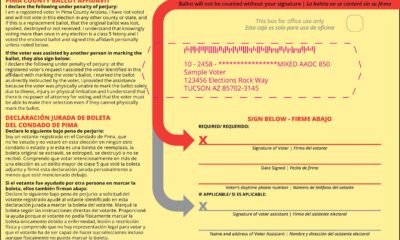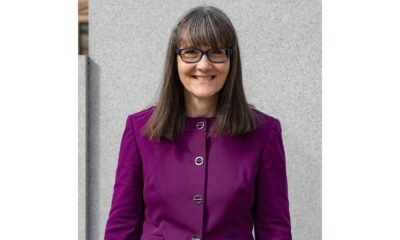arizona
College Students Break Down Barriers as Early Voting Kicks Off

As the presidential campaign reaches its final weeks, candidates are intensifying their outreach in swing states, particularly targeting college campuses. However, students in some of these key states are facing new challenges that could hinder their ability to vote.
This November marks the first general election in North Carolina where a 2018 voter ID law will be enforced, following a legal battle that delayed its implementation. Despite universities’ efforts to help students obtain valid identification, many discovered that digital college IDs stored on their phones would not be accepted.
Similar concerns have emerged in states like Arizona, Indiana, and Texas, where students worry about limited polling locations on their campuses. In Georgia, misinformation at Emory University regarding the correct voter registration campus address has created additional complications for students there.
According to the Center for Information & Research on Civic Learning and Engagement (CIRCLE), nearly 41 million Generation Z Americans are eligible to vote in the upcoming election. This demographic could play a pivotal role, especially in races expected to be decided by narrow margins.
Voting laws are inconsistent from state to state, and access to polling places varies widely among the approximately 18 million students enrolled in undergraduate and graduate programs nationwide. The added complexity of last-minute legal changes, particularly around voter ID regulations, heightens confusion and may discourage participation, explained Alberto Medina, a spokesperson for CIRCLE.
“Youth turnout often isn’t low because of apathy,” Medina noted. “Challenges exist, and voting is not as straightforward as many think.”
Participation among young voters surged to 50% during the 2020 presidential election, marking an 11-point increase from 2016, as per CIRCLE’s analysis. Yet, barriers persist, such as inadequate civic education and logistical challenges like registration confusion and transportation to polls.
The recent developments in North Carolina illustrate these complications. A ruling from the North Carolina Court of Appeals specified that digital IDs, including those from the University of North Carolina at Chapel Hill, are not acceptable for voting. This late decision has created urgency among campuses to inform students and provide physical ID options.
Elon University, located east of Greensboro, has launched a campaign to educate students about the new ID requirements, including distributing free physical IDs compliant with the law. Student leaders have engaged their peers through yard signs and classroom discussions to ensure everyone understands how to obtain a valid ID.
However, some students believe the situation is not as concerning as it has been portrayed. Matthew Trott, a junior at UNC and president of the College Republicans, expressed skepticism about widespread issues arising from the ID change, noting that many peers utilize their North Carolina driver’s licenses to vote.
As excitement builds for the election, polls indicate strong voter engagement among young people. A survey from the Harvard Kennedy School revealed that 56% of young adults aged 19 to 29 are committed to voting, with greater enthusiasm among Democrats.
This enthusiasm is echoed at Arizona State University, where public policy and economics major Katie Ritchie noted an effective push toward youth engagement in presidential campaigns and local issues like abortion rights. Both Ritchie and Dalrymple work as student ambassadors for the Andrew Goodman Foundation, helping foster civic engagement on their campuses.
While the University of Arizona has faced backlash over the absence of a voting center on its campus, Arizona State University will have facilities available for students to vote, underscoring disparities in access that could influence turnout.
Debates surrounding polling places are not confined to Arizona. In Texas, the Tarrant County Commissioners Court recently rejected a proposal that would have removed early voting sites at college campuses, emphasizing the need for equitable access to the electoral process.
Rashawn Davis, executive director of the Andrew Goodman Foundation, acknowledged that barriers to voting for college students are long-standing issues. However, he remains hopeful as young voices gain traction on critical matters influencing their futures.


















